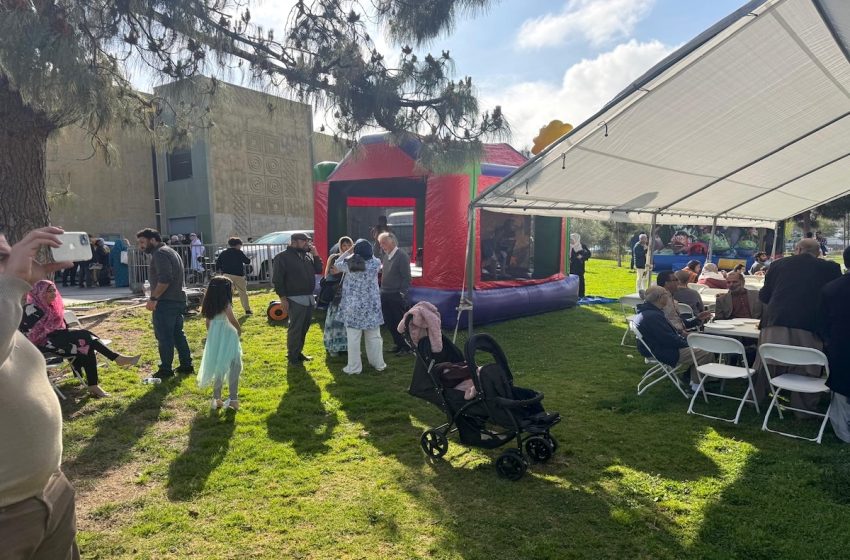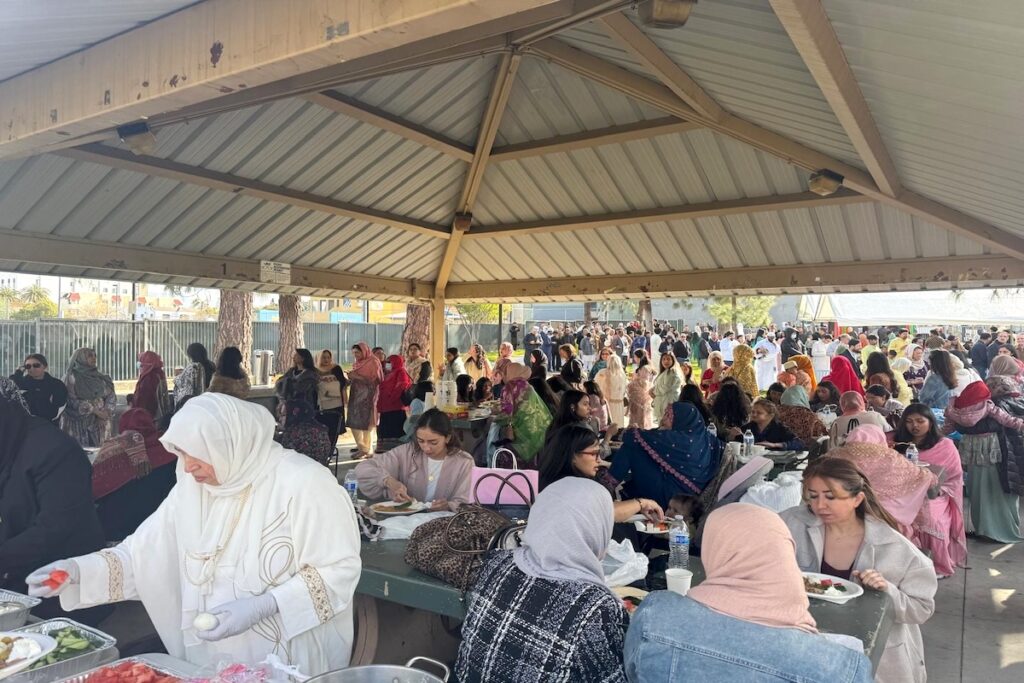How One Glendale Park Became a Hub for Arab and Muslim American Families

May 12, 2025
For Southern California’s Arab American and Muslim families, Pacific Park has become a place where faith is practiced openly, community ties are strengthened, and children grow up seeing their cultures celebrated under the open sky.
Fatmeh A. Bakhit & Dahlia M. Taha | Al Enteshar Newspaper
GLENDALE, Calif. — On a bright spring morning in Glendale, Pacific Community Center & Park is buzzing with life and energy as families dressed in bright colors and polished shoes pour out of their cars, ushering excited children toward the Community Center for morning prayer. After the prayer concludes, the celebration continues outside. Prayer rugs are spread across the grass, boxes of dates are unpacked, and greetings of “Eid Mubarak!” are exchanged with warm hugs between old friends and new faces alike.
But this isn’t just another holiday gathering. For Southern California’s Arab American and Muslim families, Pacific Park has become much more: a place where faith is practiced openly, community ties are strengthened, and children grow up seeing their cultures celebrated under the open sky.
“This is our Eid masjid now,” explains Mohammad Khalil, 36, as he adjusts his son’s tiny kufi. “We pray here, we eat here, we see people we haven’t seen all year. It’s bigger than just prayer—it’s about feeling like we belong.”
Khalil and his family, Glendale residents for nearly two decades, say the park’s transformation over the years mirrors the growth and visibility of the Muslim community itself. Once scattered in small, rented prayer spaces around the city, gatherings like the one on March 30 now easily draw hundreds of families.
“It’s funny,” Khalil adds, glancing across the field at the sea of prayer rugs and picnic blankets, “When I was a kid, we had to squeeze into basements or small halls. Now, my kids are praying outside, in the sunshine, with everyone around them. That matters.”
Faith in Public Space

During Ramadan and Eid especially, Pacific Park becomes more than a playground and recreation center, it becomes a communal mosque, a festival ground, and a gathering place rolled into one.
Organizers work with the city to secure permits for early-morning prayer services, while local families pitch in to help set up, clean up, and serve traditional treats afterward. The adjacent Community Center often opens its doors for morning prayer and post-prayer activities: arts-and-crafts for children, small bazaars offering gifts and sweets, and health clinics offering blood pressure checks.
For many families, it’s the highlight of the year.
“It’s the one time you see the whole community in one place,” explains Imaen Zuheer, 38, watching her two sons chase each other near the swings after Eid prayer. “You see Syrian families, Palestinian families, Egyptian families, Desi families, all together. Different languages, different foods, but the same feeling.”
Zuheer, who now lives in nearby La Cañada Flintridge, says she grew up rarely seeing public Muslim gatherings outside of mosques. Parks like Pacific have changed that dynamic. “It’s not just religious,” she explains. “It’s cultural. It’s about belonging to something bigger.”
Everyday Life: Playgrounds, Soccer, and Picnics
Even beyond the holidays, Pacific Park plays an important role in everyday Muslim family life.
Most weekends, you’ll find picnic tables filled with extended families. Women in hijabs chat while keeping an eye on toddlers clambering up the play structures. Fathers kick soccer balls with their sons or organize pickup games on the grassy fields. Older kids race each other on the basketball courts.
“This is our go-to spot,” explains Sania Khan, 27, who came to the park with her cousin Summer and a few friends after Eid prayer. “We’ll pack some food, grab a soccer ball, and stay here all afternoon. It’s the only place nearby where we can just exist without worrying who’s looking at us weirdly when we pray or when we show up in traditional clothes.”
Her cousin Summer adds, “And you’re always guaranteed to bump into someone you know. It’s like a Muslim community center without walls.”
The cousins, both originally from Pasadena, said Pacific offers a rare blend of accessibility and comfort. It’s central, family-friendly, and feels welcoming, not sterile or overly policed—an unfortunately common experience for Muslim Americans in some public spaces.
Not Just a Park: A Cultural Backbone

For the Arab American and broader Muslim community, parks like Pacific aren’t luxuries. They are cultural backbones.
Public spaces where they can celebrate, gather, and raise children visibly Muslim and Arab without fear or discomfort are rare and increasingly precious. The presence of so many Muslim families at Pacific Park is not just organic; it’s deeply intentional.
“We claim this space by using it,” Khalil explains when asked about the cultural importance of having a space to gather. “By showing up. By filling it with life.”
It’s a quiet act of resistance against invisibility, a way to carve out public space where hijabs, Arabic greetings, and communal prayer mats are ordinary, not unusual.
In a region where Arab Americans and Muslims have sometimes faced suspicion, hostility, or even surveillance, the simple freedom to gather without fear is priceless.
“After everything in the last 20 years—9/11, the travel bans, the surveillance—there’s something powerful about being able to spread out your rug in a public park and say, ‘I’m here. We’re here,’” Zuheer answers.
A Future Rooted in Community
As the morning prayers gave way to picnics and pick-up soccer games, there was a sense that the real celebration wasn’t just about Eid. It was about community resilience, about building a future where children grow up seeing their traditions celebrated openly.
Many families, like the Khans, see Pacific Park as a kind of second home. “When I think about raising my kids one day,” Sania said, watching a group of boys sprint past her, “I imagine bringing them here for Eid. I imagine them growing up knowing that public spaces belong to them, too.”
Before the afternoon heat kicked in, families began unpacking Tupperware containers: kabsa, kebabs, sambousek. Someone set up a speaker playing Fairuz. Children lined up for face painting at a booth organized by a local Arab American youth group.
At Pacific Community Center & Park, the spirit of Eid, of togetherness, celebration, and belonging wasn’t contained to one prayer or one event. It was stitched into the grass, the playground, and the picnic tables. It was stitched into the community itself.


